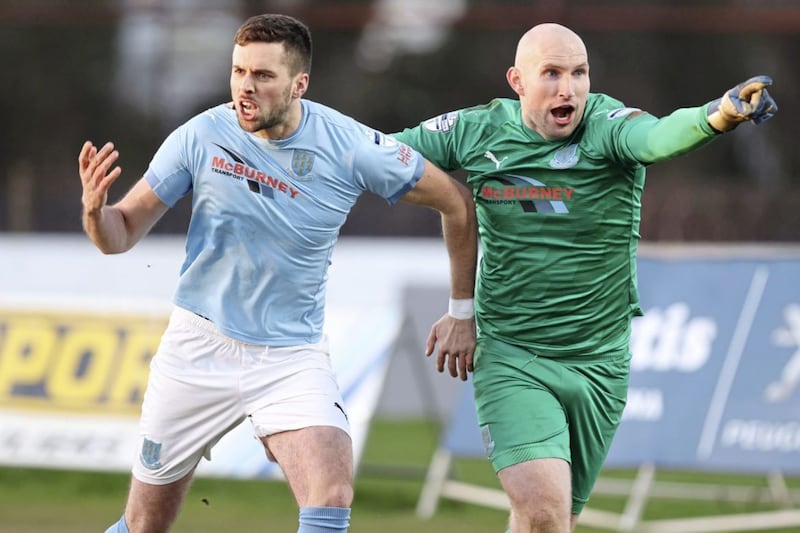A member of an IRA unit who survived a deadly SAS ambush at Loughgall which claimed the lives of eight republicans has broken his silence for the first time on the 30th anniversary.
The republican, who does not want to be named, was one of three IRA members who escaped the SAS ambush in the sleepy Co Armagh village that night.
The IRA man, who we have called Scout One, describes in remarkable detail how he and another member of the IRA team came face to face with the SAS but lived to tell the tale.
A third IRA man, Liam Ryan, also escaped the lethal ambush.
In an unprecedented interview the former IRA man provides the inside story on the republican movement's single largest loss of life during the Troubles.
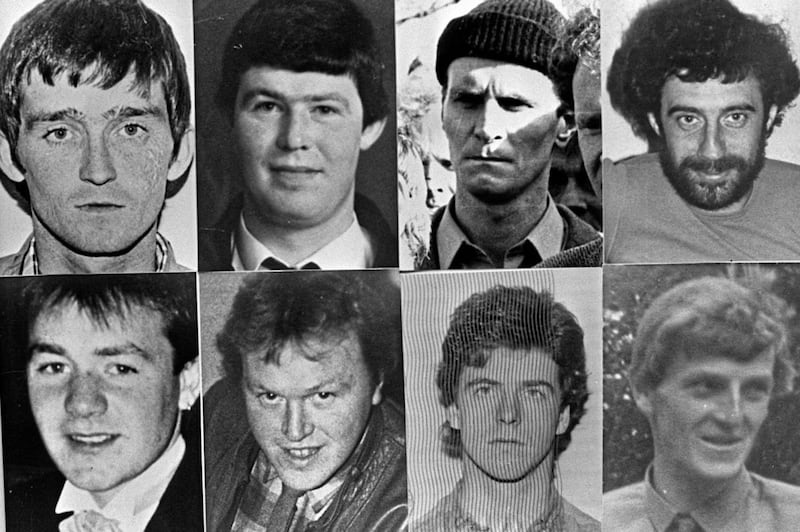
Scout One also reveals that members of the IRA unit debated whether to go ahead with the attack at the roadside but at the last minute decided to proceed with the plan.
While plenty has been written about the Loughgall ambush in the intervening three decades, little detail of what actually happened in the village has ever been made public.
Eight IRA men and civilian Anthony Hughes, who unknowingly drove into the area, were shot dead in the ambush which took place 30 years ago today.
There have been suggestions that informers provided information to the security forces about the IRA's plans.
However, last year a member of a British army intelligence unit claimed in a book that they found out about the planned Loughgall attack after spotting a known IRA man scouting diggers to steal in the area.
Some now believe that a combination of many threads of information allowed the security forces to conclude that Loughgall barracks was a target and to be ready and waiting to take out the IRA team.
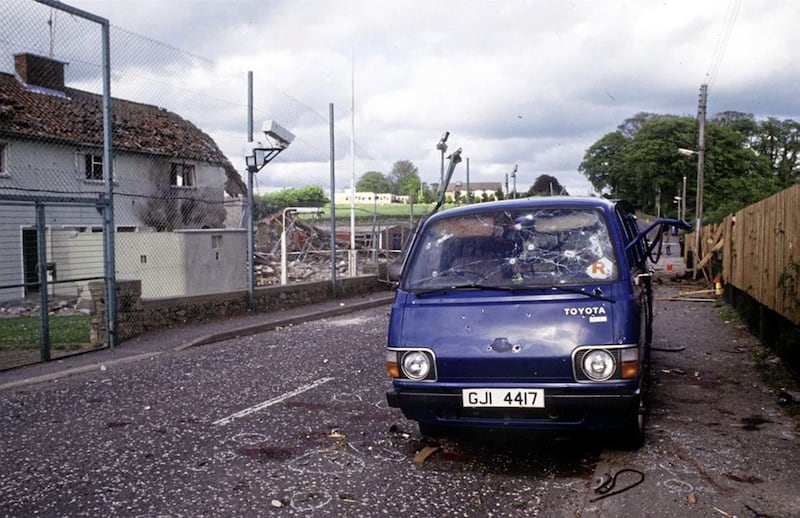
On the night of the ambush the IRA had planned to storm the police station with guns and a bomb placed in the bucket of a digger driven by Declan Arthurs, who was from Galbally, near Dungannon.
The unit had hoped to reach the station as three RUC officers were expected to clock off duty.
Sources say the IRA had been watching the police station in the run up to the attack and had established the officers left the station at the same time each night.
The plan was to kill the RUC men and demolish the station immediately on entering the village.
Scout One reveals how he drove with other members of the IRA team into the village from the Portadown direction, passing the police station to a point at the opposite end of the village.
After the attack was carried out the IRA team was supposed to make its way to him and another IRA man at the pick-up point where they were to be driven from the area to a safe house.
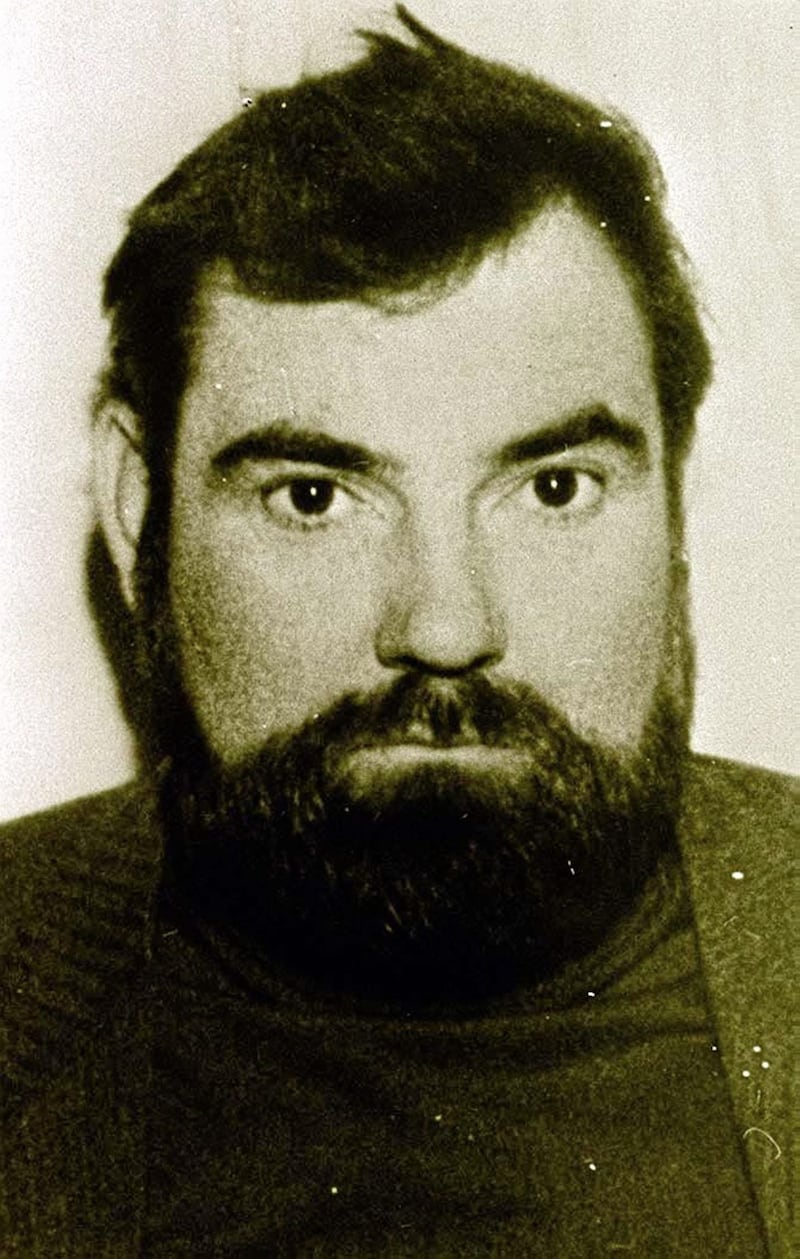
“We were to sit there until the boys came back around again, until the bomb went off and they had shot it (the station) up,” he said.
“The point of the operation was to get in before they left, to take them (the RUC men) out.”
He explained that Arthurs unexpectedly appeared at the pick-up point in the digger minutes after the two getaway vehicles.
The other IRA men arrived quickly behind him in the Toyota Hiace.
It later emerged that Arthurs had spotted the police car which was supposed to be in the RUC station while he drove the bomb into the village and “decided not to go ahead” with the attack.
Scout One says that after having a discussion about what to do a second member of the IRA team, who also survived and is referred to as Scout Two, drove Arthurs back into the village in another car.
“They were away for three or four minutes and there was still a discussion about what to do,” he said.
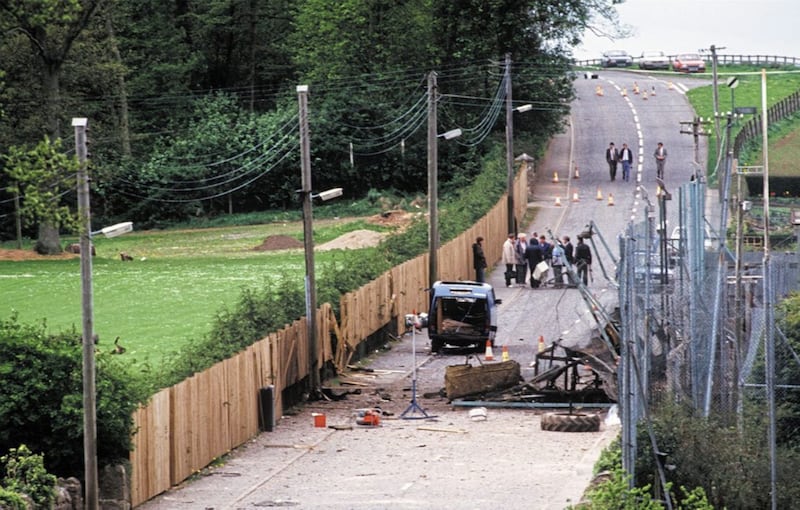
Scout One said he was then told by Paddy Kelly, who the most senior IRA member in east Tyrone, to drive into Loughgall and bring the other two IRA men back after a collective decision was taken to go ahead with the planned attack.
The survivor says that when he located Declan Arthurs and the other scout they were sitting on the roadside monitoring the police station, which at this time (unknown to them) was manned by six SAS men and three officers, including two members of the specialist Headquarters Mobile Support Unit (HMSU) and a local officer in case a member of the public arrived at the barracks door.
He said that although Arthurs had a bad feeling about the operation he didn’t question the request to carry out the attack.
It is understood the 21-year-old was concerned by the lack of activity by members of the public in Loughgall on what was a sunny May evening.
“He said at the start ‘there is no point in doing the operation, the target is away’,” said Scout One.
In total 24 SAS men had been strategically deployed at different points around the station and had set up a ‘kill zone’.
Republicans say this also involved establishing a three point triangular formation designed to eliminate everybody in the ‘kill zone’ while reducing the risk of friendly fire.
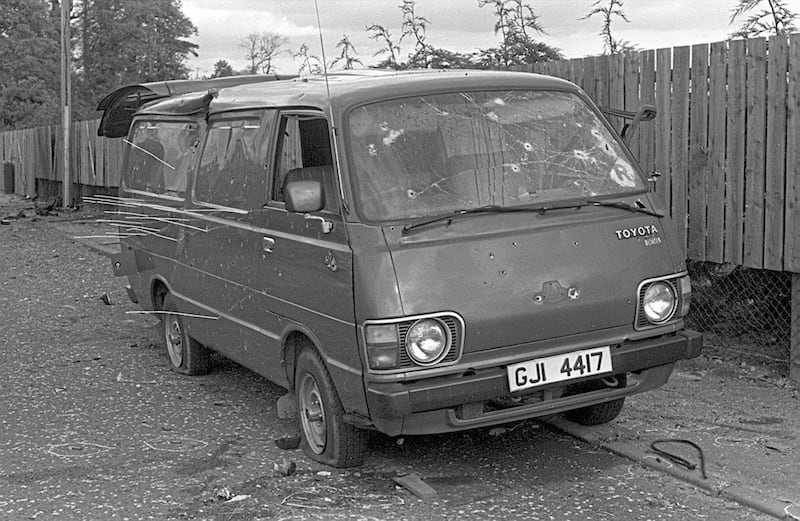
The SAS men were armed with an array of automatic weapons including two general purpose machine guns (GPMGs) located within sight of the police station.
Scout One says that once the decision was taken to go-ahead with the attack, little time was lost.
“We came back to the point where the rest of the boys were and Paddy Kelly said we are going to go in and blow the barracks up and fire a few rounds,” he said.
“Declan went into the digger and the boys followed him.”
After sweeping past the station one more time, the IRA team turned both the digger bomb and van before returning to the front of the police station.
Around this time it is believed Arthurs used a lighter to ignite a fuse leading to the bomb and aimed it at the heavy security doors of the station.
It is believed members of the IRA team travelling in the Hiace van leapt from the vehicle and sprayed the station with gunfire.
The SAS also opened fire from various vantage points, including from within the station itself.
After coming under heavy fire, it is believed Arthurs collided with a blast wall at the entrance of the barracks before jumping from the digger.
Seconds later the bomb exploded causing extensive damage to the station and injuring some of those inside.
An unarmed Arthurs, who was wearing a white jacket, sweatshirt and blue jeans, was shot multiple times a short distance away as he tried to escape along a nearby laneway which led to a locked gate.
His body was later found with a lighter in his hand.
While the attack was taking place Scout One and Two waited a short distance away at the pick-up point.
“We were at the pick-up point and then there was a rip as the bomb went up,” he said.
“There was a rattle of stuff (gunshots) and then there was a rattle of heavy stuff (British army GPMGs)
“I tuned to (Scout Two) and said: ‘They are giving her some rattle here.’
“It went on and on and on, for what seemed like three or four minutes, it was fierce firing.
“Then out in the distance I saw a helicopter and I turned to (Scout Two) and said ‘there’s something badly wrong here’.
“At this stage we were waiting on them (the IRA team) to come down and get away.”
The IRA man says that when members of his unit failed to appear he and his colleague became concerned.
He said as they made their way into Loughgall in separate vehicles to see what was happening they came face to face with members of the SAS ambush team close to the village.
“Another couple of cars with civilians came behind us and two SAS men jumped out and they turned their weapons on us,” he said.
“I didn’t know what was going to happen.”
The IRA man said several other SAS members lept from behind a wall and ran towards the bomb team’s Hiace van, which was a short distance away.
Scout One said that during the incident an SAS soldier stood two to three feet in front of his vehicle and pointed an M16 Armalite at him.
“I know for a fact to this day, when you look in someone’s eyes, they knew we were involved.
“The other boy had a gun on (Scout Two).
“They knew we were involved. They had observed us for 20 minutes before it.”
He said that as he sat “frozen” in the cross hairs of the SAS man’s sights he could see the blue Hiace van and the bodies of his IRA colleagues lying around it.
He said that while the SAS men he encountered were calm, others were “dancing” around the van.
“At that stage there was an odd isolated shot,” he said.
“I knew they were wiped out at the time.
“I could see the carnage down at the van.
“At the same time it was a shock to know everybody was away.
“The boys (SAS men) who were with us were in control, but the boys around the van were in a frenzy.”
The IRA man believes there was ample opportunity to arrest the bomb team.
“I have no doubt it was a shoot to kill operation, it was a Turkey shoot,” he said.
“They could have rammed the van, the boys were sitting in a vulnerable situation, crammed in the van.”
“There was a ten-minute window from the lads going through the village the first time to when they went back in again,” he said.
“They let the bomb through and they waited ten minutes because they wanted them in the kill zone,”
“There was ample time for arrests to be made.”
Scout Two said that within minutes a large number of ‘regular’ British soldiers jumped from the helicopter he had spotted earlier and made their way to the road where he was sitting in his vehicle.
He said the SAS men then “disappeared”.
“We sat there frozen,” he said.
“There was an auld pair behind us and at this stage there was five or six Brits around.
“I swore I was going to be dragged out.”
Scout One said that suddenly he, the elderly couple and the other IRA men were ordered to turn their vehicles and leave the area by a British soldier.
“I turned the vehicle thinking we were going to get emptied (shot),” he said.
Having just survived the encounter with the SAS, both IRA men made their escape in different directions.
Scout One revealed that despite his near shave he has no regrets about driving towards the ‘kill zone’ in a bid to rescue members of the bomb team after they were ambushed.
“If someone had made a go for it, I could have lifted him,” he said.
“And I am glad I did that.
“I don’t think I could have lived with myself if I had not.”
Seconds after escaping the area Scout Two met Liam Ryan on a country road a short distance away and told him what had happened.
Ryan had been in radio contact with the bomb team seconds before the attack.
He was later killed in an attack claimed by loyalists more than two years later at his bar in Moortown, Co Tyrone.
At the time of his death he was one of the most senior IRA men in Co Tyrone and sat on the organisation’s ‘Brigade Staff’.
Scout One says he doesn’t know why he and the other IRA man were allowed to leave the area but believes the elderly couple who were also being held at the roadblock may have been viewed by the soldiers as witnesses.
“I would say a big part of it was the auld pair,” he said.
“They just had their weapons trained on us, they never even looked at the other boys running down the road.”
Scout One’s feelings of relief at escaping death were quickly dampened when seconds later he drove straight into an RUC checkpoint a short distance away.
“Again I was stopped and taken out of my vehicle,” he said.
“I had a load of clothes belonging to the lads in the back.
“I said to myself ‘this is it this time’.
“They asked me what I was doing in the part of the country and I told them I was working.
“I gave them a false name.
“I had false plates and they had to be coming up wrong (in the police computer system).”
“I thought I had rode our luck the first time.
“I was waiting to be cuffed.”
Despite his worst fears he said that after about five minutes an RUC officer told him he was free to leave.
“I got into the vehicle again very slowly, I didn’t know what was happening, was I being set up for something?”
The IRA man, who had by this time slipped the net for a second time, then made his way to a safe house.
He confirms that Scout Two and Liam Ryan both made their way to Monaghan, while several other members of the IRA unit who were in the wider area, but not in the village, also managed to escape.
He said that after the Loughgall ambush the IRA in Tyrone reorganised and went on to kill eight British soldiers using a roadside bomb between Ballygawley and Omagh in August 1988.
While he said he had no involvement in that operation it brought about a sense of settling a score.
“It was eight for eight,” he said.
The Loughgall ambush represented the largest single loss of life suffered by the IRA during the Troubles.
Among those killed was Paddy Kelly, the IRA ‘Officer Commanding’ in East Tyrone at the time.
Other senior republicans to die included Jim Lynagh and Padraig McKearney, who were both seasoned veterans of the IRA’s campaign.
Scout One, who is no longer involved with the republican movement, said that despite the passing of 30 years, he still thinks about what happened at Loughgall.
“I still think about it every day,” he said.
“You always felt something hanging over you.
“There was nothing resolved, there was no conclusion.”



